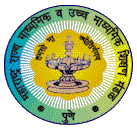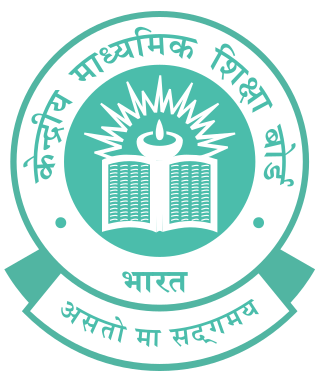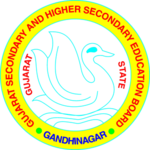
Matriculation is the formal process of entering a university, or of becoming eligible to enter by fulfilling certain academic requirements such as a matriculation examination.

The Maharashtra State Board of Secondary and Higher Secondary Education is a statutory and autonomous body established under the "Maharashtra Secondary Boards Act" 1965. Most important task of the board, among few others, is to conduct the SSC for 10th class and HSC for 12th class examinations. It is the most popular education board in terms of enrollment in high school in India only after the Central Board of Secondary Education.
In India, board examinations refer to the public examinations that are conducted at the end of the completion of Secondary and Senior secondary Education .The class 10 Board Exam are conducted by State Board, Central Board of Secondary Education And Council for the Indian School Certificate Examinations .The class 10 th exam is important for continue of Secondary Education.After Completion class X exam the Student persuade in different stream such as Science Commerce and Arts ( Humanities).The Class 12 Board Exam are conducted by State Board (HSC), Central Board of Secondary Education (AISSCE) And Council for the Indian School Certificate Examinations ( ISC). The scores achieved in XII exams are considered very important for getting into universities, professional courses or training programmes and other occupations Such as getting in Major Public / Private University(College) or Institute of national importance Such as AIIMS, NIT,IIT, IIIT And IIM.
Kerala Board of Public Examination is the state level education board of Kerala. It is administered by the Government of Kerala. The board is responsible for conducting various examinations on the basis of a unified law. Its headquarters are located at Pareeksha Bhavan, Poojapura, Thiruvananthapuram.
Madhyamik Pariksha or simply Madhyamik is a centralized examination conducted by the West Bengal Board of Secondary Education in West Bengal, India, at the end of the 10th year of school education. Similarly, one examination is also conducted at the state of Tripura for its students studying in Govt or Govt Aided school under the control of Tripura Board of Secondary Education. By count of examinees, it is among the better-known 10th standard examinations in India. In WBSE, over 600,000 students took the exam in 2000, and the number has increased substantially since then. The number of students reached a record 1 million in the 2011 Madhyamik examination. Compulsory subjects are first language, second language, physical science, life science, mathematics, history and geography.
The Secondary School Leaving Certificate is a certification obtained by a student on successful completion of an examination at the end of study at the secondary schooling level in India. The SSLC is obtained on passing the grade 10 public examination, which is commonly referred to as 'class 10 board examinations' in India. SSLC is a common eligibility examination popular in many states in India, especially Kerala, Karnataka, and Tamil Nadu. The SSLC is also called as Secondary School Certificate (SSC) in Andhra Pradesh, Telangana, Maharashtra and also as High School Certificate (HSC) in Madhya Pradesh and also as Matriculation in many states of India.
In the Indian education system of some Indian states, the Pre-University Course (PUC) or Pre-Degree Course (PDC) is referred to as Intermediate or +2 Course, which is an two-year senior secondary education course that succeeds the tenth grade and precedes to the completion of an Senior Secondary Course. The First Year of the PUC is commonly referred to as 1st PUC or Class 11th,, and the Second Year of the PUC as 2nd PUC or Class 12th. A college which offers the PUC is simply known as a 'PU college' or 'Intermediate College' which is also referred to as junior college.
The Higher Secondary School Certificate (HSC) or Higher Secondary Education Certificate (HSE) is a secondary education qualification in Bangladesh, India and Pakistan.

The A-Level is a subject-based qualification conferred as part of the General Certificate of Education, as well as a school leaving qualification offered by the educational bodies in the United Kingdom and the educational authorities of British Crown dependencies to students completing secondary or pre-university education. They were introduced in England and Wales in 1951 to replace the Higher School Certificate. The A-Level permits students to have potential access to university if their grade is of satisfactory quality.

Jawahar Navodaya Vidyalaya (JNV) is a system of central schools for talented students predominantly from rural areas in India, targeting gifted students who lack access to accelerated learning due to financial, social and rural disadvantages.
As per the 2011 census of India, Andhra Pradesh has an overall literacy rate of 67.35%, significantly lower than the overall national average of 74.04%. Among the Indian states and union territories, it stands at 32nd position. There were a total of 29,859,982 literates: 16,549,514 males and 13,310,468 females. In terms of district-wise literates, united East Godavari has the most with 3,348,077 and united Vizianagaram has the least with 1,238,388. The government also implements fee reimbursement scheme for the economically backward sections of the state.

The Central Board of Secondary Education (CBSE) is a national level board of education in India for public and private schools, controlled and managed by the Government of India. Established in 1929 by a resolution of the government, the Board was an experiment towards inter-state integration and cooperation in the sphere of secondary education. There are more than 27,000 schools in India and 240 schools in 28 foreign countries affiliated to the CBSE. All schools affiliated to CBSE follow the NCERT curriculum especially from class 9 to 12. The current Chairperson of CBSE is Nidhi Chibber, IAS.
All India Secondary School Examination, commonly known as board exams, is a centralized public examination that students in schools affiliated with the Central Board of Secondary Education in India and elsewhere take after class 10. The board conducts the examination during the period of February every year even after implementing the ambitious project of Continuous and Comprehensive Evaluation. Now that the board has ended the Continuous and Comprehensive Evaluation pattern as a result Joint Employment Test, NEET, etc., the exam is conducted by the National Testing Agency instead. In this exam, Mathematics, Science and Social Science are compulsory with any two languages. Students can also opt skill subject such as information technology, painting, yoga, music or artificial intelligence. Successful candidates are awarded the Secondary School Completion Certificate, a Statement of Marks, and a Migration Certificate stating that the candidate has completed Secondary Schooling and can pursue higher education. For the 2016-17 academic year, the Central Board of Secondary Education has revived the old system of syllabus and marking scheme (complete syllabus for All India Secondary School Examination and marks out of 500 India has state exams and central exams.

Madhya Pradesh Board of Secondary Education is a board of school education in Madhya Pradesh State of India.
The Teacher Eligibility Test, known as TET, is the minimum qualification required in India for a person to be eligible for an appointment as a teacher for Classes I to VIII. The test is mandatory for teaching jobs in Indian government schools. Similarly, UP Government introduced another qualifying after UPTET called Super TET. The TET is conducted by both the central and state governments of India. Most states conduct their own TET. The test is conducted to meet the objectives of the Right of Children to Free and Compulsory Education Act, 2009. The TET certificate is valid for lifetime.
The All India Senior School Certificate Examination (AISSCE) also called Class 12Board Exams in common language, is the final examination conducted every year for high school students by the Central Board of Secondary Education on behalf of the Government of India.
Chhattisgarh Board of Secondary Education is a board of education in state of Chhattisgarh, India. CGBSE is state agency of Government of Chhattisgarh in India, it is responsible for promotion and development of secondary education in Chhattisgarh. The Board has conducted its exams independently from the year 2002, and conducts High School, Higher Secondary and Diploma Courses.
The Bihar School Examination Board is a statutory body under section 3 of Bihar School Examination Act - 1952 which is functioning under Government of Bihar devised to conduct examinations at secondary and senior secondary standard in both government and private schools belonging to state of Bihar.






